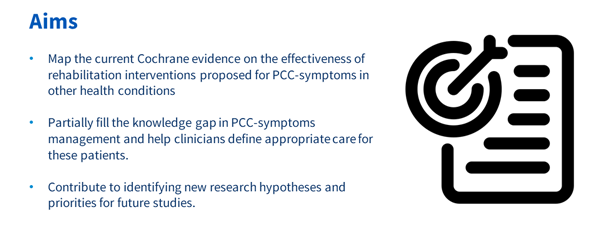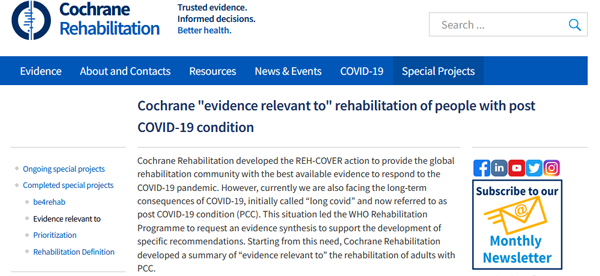Cochrane ‘evidence relevant to’ rehabilitation of people with post-COVID-19 condition
On 11 March 2020, the World Health Organization (WHO) officially declared the COVID-19 outbreak a global pandemic. The outbreak of COVID-19 caught the world off guard, sending healthcare systems into overdrive. While the immediate focus was on managing the surge of cases and saving lives, it became evident that the aftermath of this pandemic would present a unique set of challenges. Over the following years, countless individuals fell victim to this virus, experiencing an array of symptoms during the acute phase of the illness. For many people, these initial struggles resulted in a prolonged fight with persistent symptoms, collectively known as post-COVID-19 condition (PCC). Symptoms can affect various organ systems such as cardiorespiratory, neurological and musculoskeletal, as well as mental health. According to the WHO, around 10% to 20% of people who experience SARS-CoV-2 infection may develop PCC. Although the exact number of people living with this condition is not completely clear, it has been estimated that more than 17 million individuals in the WHO European Region may have experienced PCC in the first 2 years of the pandemic. As healthcare professionals and researchers grapple with the challenges posed by these long-lasting effects, the need for evidence-based support and treatment has never been more pressing, while high-quality evidence of specific treatment for PCC is not yet available.
Health equity refers to the fair distribution of healthcare resources, services and opportunities for good health outcomes, regardless of background or social status. In the context of the COVID-19 pandemic, this has been a critical consideration. Ideally, everyone should have equal access to healthcare resources and support to manage the pandemic and its consequences. However, healthcare systems and resources vary significantly from one country to another, leading to disparities in outcomes.
In May 2020, Cochrane Rehabilitation began collaborating with the WHO on a journey toward rehabilitation guidance for PCC. The mission of Cochrane Rehabilitation is to improve the production, synthesis, dissemination, implementation and impact of rehabilitation evidence at an individual, organisational and health policy level, with a global view beyond professions, culture, language and economic resources. Achieving health equity is essential when dealing with PCC, ensuring that individuals who develop PCC have equal access to medical care, regardless of their socioeconomic status, ethnicity or other factors. However, in reality, disparities in access to healthcare can exist, potentially leading to unequal outcomes for different groups. To attain Cochrane Rehabilitation’s goal, it is pivotal to identify and summarise the high-quality research on the effectiveness of rehabilitation interventions that are pertinent to PCC. By bridging this knowledge gap with evidence synthesis, we aim to provide valuable insights to guide the development of specific recommendations. These recommendations can inform health policy decisions when developing or upscaling rehabilitation services for people with PCC.
When faced with the complexities of PCC, Cochrane Rehabilitation took a pragmatic approach. Recognising the lack of direct evidence on PCC treatments, we turned to the concept of ‘evidence relevant to’. The term ‘evidence relevant to‘ is a crucial concept in healthcare and rehabilitation. It refers to a practice where interventions and treatment strategies are determined based on existing evidence for similar health conditions when direct evidence for a specific condition is limited or absent. In simpler terms, when dealing with a new or emerging health issue for which comprehensive research data are limited, healthcare professionals may draw upon the proven effectiveness of interventions used in related conditions or situations. This is particularly applicable to the rehabilitation field. In fact, rehabilitation aims at optimising functioning through interventions targeting a person’s capacity (by addressing body structures, functions and activities) and/or contextual factors related to performance. The specific health condition is taken into consideration by clinicians mainly to personalise the interventions and exclude relevant contraindications.

The ‘evidence relevant to’ project provided a mapping synthesis of Cochrane Systematic Reviews on adults experiencing relevant impairments or symptoms due to PCC. The results have been reported in five distinct categories:
- Dyspnoea: Breathing difficulties.
- Arthralgia: Joint pain.
- Fatigue, post-exertional malaise and orthostatic intolerance: Overwhelming tiredness, worsened by activity and difficulty in standing.
- Dysphagia, dysphonia and olfactory dysfunction: Swallowing and speech difficulties as well as loss of smell.
- Cognitive impairment, anxiety and depression: Mental challenges, including memory issues, anxiety and depression.

This comprehensive effort was more than just an academic or research exercise; it was a vital step towards improving the lives of individuals suffering from PCC. The findings provided a glimmer of hope for healthcare professionals and patients alike. They offered a starting point for developing targeted interventions and strategies to alleviate often debilitating symptoms of PCC, avoiding the disparities in healthcare access and information that can prevent some groups, particularly people with disabilities, from receiving the best available care.
This endeavour marks the first step towards fostering health equity. It nurtures valuable hypotheses for clinical practice and lays the foundation for future research. The findings from this effort laid the foundation for three key recommendations for managing PCC symptoms, which have subsequently been incorporated into the WHO guidelines for clinical practice.
Cochrane Rehabilitation’s collaboration with the WHO has been helpful in navigating the uncertain landscape of post-COVID-19 care. It showcased the potential of evidence-based practice in guiding treatment decisions when faced with novel and complex health conditions.
We need to maintain focus on the challenges and potential disparities in healthcare access and outcomes related to the COVID-19 pandemic and PCC. Achieving health equity in this context would mean ensuring that all individuals – regardless of their background, and including people with disability – have equal access to healthcare resources, information and evidence-based treatment for COVID-19 and its long-term consequences. This is a critical goal to strive for in addressing the ongoing and future health crisis.
Key Messages
- The power of working together: The collaboration between Cochrane Rehabilitation and the WHO exemplifies the importance of collaboration in addressing global health challenges. By pooling their resources and expertise, these organisations were able to make significant strides in understanding and managing PCC globally, including in low- and middle-income countries.
- Evidence generation: Cochrane Rehabilitation’s ‘evidence relevant to’ approach has been the first attempt to generate this evidence, providing valuable findings to the WHO for guideline production and large-scale dissemination.
- Guidance for the future: The insights gained from WHO and Cochrane Rehabilitation’s work pave the way for evidence-based recommendations that can improve the lives of those living with PCC and experiencing disability.
Authors
Matteo Johann Del Furia,1 Luca Miranda,2 Claudio Cordani1, 3
1. IRCCS Istituto Ortopedico Galeazzi, Milan, Italy
2. IRCCS Fondazione Don Carlo Gnocchi, Milan, Italy
3. Department of Biomedical, Surgical and Dental Sciences, University ‘La Statale’, Milan, Italy
Disclaimer
The views expressed in this World EBHC Day Blog, as well as any errors or omissions, are the sole responsibility of the author and do not represent the views of the World EBHC Day Steering Committee, Official Partners or Sponsors; nor does it imply endorsement by the aforementioned parties.
